Wess Speaks (Part IV)
We recently gave you the opportunity ask our president, Wess, any questions you like. We’re publishing his transcribed answers one day at a time.
- What do you think is the largest challenge in eradicating poverty on the earth? (Allan)
Continue Reading ›The biggest challenge of eradicating poverty in the world isn’t finding enough money to throw at it. We often think that poverty is a lack of money. That’s a big piece of it, but it’s not the whole of it, or even the most critical part of it. If it was, I think we could probably organize our world to throw enough money at it to make it go away.
But poverty is much more complicated than that — it’s not about the kind of house that you live in or whether a sewer runs in front of your house. It’s not about the amount of calories you take in or the amount of money you have. Those are only the symptoms of poverty. That’s not real poverty. Real poverty is much more complicated than that and it doesn’t just happen overnight. It rolls down through the generations.
At Compassion we realize that the biggest challenge of poverty is a mindset — a lie that says to a child:
Look around you, nothing works, nothing is pretty nothing smells good — you don’t matter. Look at you. It’s all garbage and so are you. So give up. There’s nobody coming to your rescue. Nobody cares about you, just give up.
We must go into the midst of that abject poverty and breathe hope and love and life. We can meet the critical needs, but there’s no end of that. Scripture says, “So what does a man profit if he gains the whole world but loses his soul?”
What I think is the hardest thing is mobilizing God’s people around the world to not only send their money but to send their hearts and enter into the hurt of a little child and breathe hope:
Don’t give up. I’m watching you grow. I got your report card. I got your picture. I pray for you every night. I think you’re wonderful. Don’t give up.
If we could get enough people in the western world — this rich world that you talk about, Allan — to do that, we could absolutely end poverty on our planet. It’s not going to end with more effort. It’s not going to end with more money. It’s going to end with more heart.
Those of us who have been blessed have been blessed for one reason and one reason only, and that is to be a blessing. Anything God gives you beyond enough ought to be given away to lift someone else up to enough.
Wess Speaks (Part III)
We recently gave you the opportunity ask our CEO, Wess, any questions you like. We’re publishing his answers one day at a time.
- How does it feel to be making such a large salary? Do you feel like it would benefit more children in poverty if you were to take a cut in pay so that more of those funds could go toward ministering to children? (Kayla)
Continue Reading ›This is a fair question because this is a non-profit organization and this type of information is on public record. Anyone who wants to find out what the leaders of Compassion make can review our 990 form.
There are some decisions that I don’t make around here, and all the decisions about what I’m paid fall to Compassion’s Board of Directors. Our Board believes that Compassion must exercise prudent business judgment in balancing the stewardship of the ministry’s financial resources, the needs of the employees, and the payment of salaries sufficient to attract and retain the well-qualified employees who are required to effectively carry out our ministry. It is important to Compassion’s Board of Directors that we represent both excellence and stewardship.
Part of our salary structure also dictates that all Compassion staff are paid relative to that of the top position in the organization, which happens to be mine. So, if I were to be paid less, it means that every person below me in the organization would also be paid less. I have staff reporting to me who are responsible for managing a budget of nearly $400 million. It requires a high level of management competency to effectively supervise all that has been entrusted to this ministry.
I wish we lived in a world where Christians could fully focus on what we feel the Lord has called us to do without also having to worry about paying a mortgage, putting children through college, caring for aging parents, planning for retirement, etc. But, this is a reality that American non-profits (probably including many of our churches and some government officials) have struggled with for a long time.
What my wife and I have determined – and what I think everybody has to determine for themselves is – what is enough? Anything beyond enough can trap you. I live a very modest life, with a modest house and a modest car. Once Donna and I figured out what was enough for us, we agreed to just give the rest away. In fact, we give quite a lot of it right back to Compassion—we sponsor lots of kids and support every other mission effort that goes out of this place.
The truth is I would work for Compassion for absolutely nothing if it were possible.
Wess Speaks (Part II)
We recently gave you the opportunity ask our president, Wess Stafford, any questions you like. We’re publishing his transcribed answers one day at a time. Here’s the background skinny.
- How do you balance your priorities between a “job” that is way more than a job and your family? (Amar Rama)
- I’d love to hear how Wess navigates the two worlds he inhabits. On one hand, he lives in a world of poverty and need. On the other, he lives in … well, America. (Kelly @ Love Well)
- I would like to know how you think your daughters were shaped and influenced by growing up in the midst of Compassion’s ministry. How did you balance giving them the joys of a carefree childhood while at the same time exposing them to the needs of the world in order to grow in them a heart for those living in poverty? (Jennie Thengvall)
It has been tough to go back and forth between these two worlds. My wife Donna and I determined we would give our lives in ministry to the poor but we promised each other that it would never come at the expense of our own children. That was a commitment that we made –- we would work very hard on behalf of the children of the world but not at the expense of our own. And so I have worked far harder at my role as father than I have even as Compassion’s president.
God gave me two daughters, Jenny and Katie. When my children were young and I was traveling, they knew that I would always rather be home with them more than with anybody else, no matter where I was in the world. So I sent postcards. (It was before e-mail.) I would call my children the last minute before I climbed on a plane to leave America and the first minute I was back.
In the evenings when I was home, I never missed a chance to put my daughters to bed. I thought bedtime was about the most teachable, precious moment I had. I taught my girls hymns every night. I told them a story every night of growing up in Africa. I was determined not to leave my girls behind. I didn’t want them to resent the poor. I didn’t want them to resent Compassion. I wanted them to know that this was their ministry, too.
I prayed with my daughters. One of the reasons they love Compassion is because it’s been a part of their lives since they were 2 and 3 years old. From the time my little girls could lisp a prayer, they prayed for the children that we sponsored.
I honored their mother. I spoke so well of their mother –- about what a hero she was –- doing so much in the house, which allowed me to travel overseas and not worry about my own home. Every three years I took them somewhere with me to see the work. Haiti, Brazil, Ecuador, Africa … I built it into their lives. The best proof is that they now sponsor kids with their own money.
In my book Too Small To Ignore there is a whole chapter on how we blended those two worlds. (By the way, all of the royalties from the book go straight to Compassion.)
Wess Speaks
We recently gave you the opportunity to ask our President, Wess Stafford, any questions you like. You didn’t disappoint. We got a variety of questions ranging from serious to silly.
Wess is a fascinating storyteller. We wanted you to feel as if he were answering your questions in person. So we sat down with him, recorded the interview and transcribed his answers word for word.
Instead of choosing 10, he wanted to answer them all. (We combined some of the similar questions.) Because of the length of his answers, we’ll answer one question per day.
- How did you get involved with Compassion International? (Monica @ Paper Bridges)
- What was your daily life in Haiti like? (Laurel Wreath)
My “unofficial” start with Compassion was probably when I was 5 years old, clear out in a little African village where my heart was being shaped and my respect for the poor was being formed.
My first “official” job was 31 years ago in Haiti, where I was assigned as a field worker. I was young, 27 years old, and it was wonderful. I can remember riding along in a truck thinking, “They pay me. They actually pay me to do this!” I stayed in little huts in the villages. I ate their food. I slept on the floor. It took me back to my boyhood in Africa. Most Haitians are descendents of West Africa so I was right at home.
But my biggest job in those days was sitting down and talking with leaders of poverty-stricken communities — listening to their hurts, dreams and hopes. I would write up a project, get funding for it, help that community implement that program, evaluate it and then move on to the next one. We built roads to open up isolated communities. We built hospitals and clinics. We did reforestation of mountainsides. I put in water systems, wells and captured springs and water treatment. We did a lot of relief during famine times.
At that time I represented six relief and development agencies -– Compassion was just one of six. The longer I worked in Haiti, the more I listened to the poor and the more I understood their hearts and what they would do if they had financial resources. The more I listened to them, the more they talked about children. The poor would say to me, “If you want to help me, help my child. Because that’s where my hope is, that’s where my dreams are and that’s where my resources go.”
Well I heard that enough from the extreme poor –- and Haiti isn’t just poor, it’s extremely poor –- that I realized I was not going to give my life to serving the poor unless I was able to do what the poor would do if they had financial resources. And where their money goes is to their children. So among the six agencies I worked for, it was Compassion International that honed in on children. The more I studied Compassion’s mission and what was truly important to the poor, the more strategic sense this ministry made.
After I left Haiti. I got a doctorate in non-formal education. And I have been with Compassion ever since. I’ve had just about every job in the place and have now served for 15 years as president.
So my time with Compassion goes back 31 years. And pretty much everything I need to know to lead this ministry came from the poor themselves, either in my little village in Africa or in Haiti.
A Little Can Mean a Lot
Our SpotLINK guest contributor today is A. She currently serves as a worship leader and choir director. She blogs at Be Thou My Vision and co-maintains Women in Worship, a site connecting Christian women who are passionate about worshiping and serving God through music and the arts.
I remember when I first felt God leading me to sponsor a child through Compassion. I was reading Extravagant Worship by worship leader Darlene Zschech and discovered Compassion’s information waiting for me on the book’s final pages.
I began sponsoring a girl in Honduras, wanting to do something to make a difference in her life. How humbling it was when I received a letter she sent after a gift received during the holidays enabled her family to buy items that we often take for granted, such as a pair of shoes and three pairs of socks. This letter brought tears to my eyes and makes me ache to do even more to help those in need!
As a blogger myself, I caught on to what Anne Jackson is doing at Flowerdust.net and have begun featuring at least one child on my blog weekly, particularly those who have been waiting to be sponsored for six months or more. It excites me when I find each week’s featured child has been sponsored!
Compassion also has many wonderful widgets that can help you make a difference by featuring children in need on your Web site, blog and even Facebook. Also, don’t forget to venture to Compassionbloggers.com where bloggers share their stories about Compassion and even join in on a trip to visit Compassion and the children whose lives are being changed.
Though it may seem miniscule, bloggers have a great advantage in reaching out just by bringing needy children to the attention of others who God may lead to sponsor them.
What about you? Do you sponsor a child? If you already do, could you help further by blogging about other children in need?
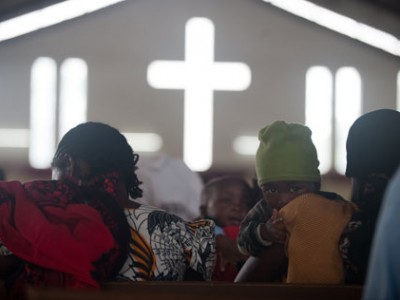
Overcoming Denominational Differences in Tanzania
About nine years ago, when Compassion began operating in Tanzania, we were received with mixed feelings by the church.
Some thought there is no genuine organization that can offer the benefits CI claims to offer to children. Some were not comfortable that we want different evangelical denominations to come together and have a common objective in releasing children from poverty in Jesus’ name.
A Response From YOUR Fan
-
- Do you have a favorite Bible verse or story that has personal meaning to you?
Yes, I do. My favorite Bible verse is Lamentations 3:21-25. And if you read the whole chapter you’ll see why even more.
My favorite Bible story is the story of Joseph, for I can associate with how brothers (and sisters in my case) can disown you or treat you in a way that suggests that you are not part of the family, and how God uses all those bad experiences not only for His glory but also to lift us up and to bless others in the process.
-
- What piece of the Compassion program had the biggest impact on you and your life? (Fellowship with Christians, having access to medical care, meals that were provided, educational opportunities, or something else?)
Gosh, it’s really hard to pick one program that had the most impact because all of them played a major role in my life as I was growing up, but the one that comes to mind was the Thursday Bible study I used to attend when I was 9 years old. It was here that I was exposed to the word of God, which gave me a chance to give my life to Christ (my best decision ever) and equip me with the basic foundation for the Word of God and fellowship with others – something I still treasure to date.
By the way, I can’t forget the meals (which tells you I love to eat … Ha!) coz honestly, this was the only place where most of us children from the slums had the chance to enjoy three meals a day.
And yes, educational opportunities, because I wouldn’t be where I am were it not for the chance to go to school.
-
- Are there things Compassion could do to improve their service to young people and families?
Smile
I just got this cute, cute picture of Pamela at her child development center, viewing herself on the blog from Wednesday’s post! Samuel says she was embarrassed at first but couldn’t help smiling once she saw it.

Non-Traditional Family Traditions
Many of Compassion’s sponsors are young families. Our family fits that category with children 9, 6, 5 and 2 years old. Not only do we want to help little ones overseas, my wife and I want our own children to realize the hope-stealing effects of poverty. We want our kids to understand poverty to a point where they’re compelled to do something about it both now and later.
Do you think this way? What traditions have you started in your own home to cultivate an understanding of what the poor go through in the developing world? We’re just starting out, and I know we can get more consistent, but here’s a glimpse of what we do:
-
- I made an 8-by-10 print of this picture taken by Tonny Tunya. It’s in our dining room. Occasionally, we pause to see whatever we’re facing through the bright eyes of these children whose playground is a garbage dump in Indonesia. At best, our conversations are speculative. But there’s truth in these talks, too. And our perspective is refined bit by bit.
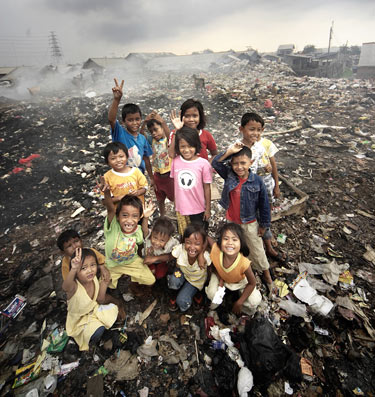
- When we sit down for a meal and make the effort to think about Karen, our sponsored child in the Philippines, and her family, our gratitude to God for the food in front of us grows deeper.
- We’re moving in the direction of connecting each one of our kids to a different sponsored child. They’ll get to minister and be ministered to through sharing words of hope, art and prayers. Who knows? Maybe our kids will be some of the few of their generation to have a true pen pal.
- I’m memorizing verses about children and the poor and my son is helping me. I hope that these scriptures sink in for him, too, and that seeing his dad take the time to do this would inspire him.
I’m sure there are many other ways to teach children about poverty through day-to-day life. I’ve heard of kids initiating fund raisers and families who rethink gift-giving at Christmas. Some of these families have even gone on one of Compassion’s sponsor tours to see it all with their own eyes.
Would you take a few moments to share your traditions? It’s OK if you don’t do them 100 percent of the time. None of us do. But we want to. And it’d be great to learn from others. The kids need it. Ours and theirs.
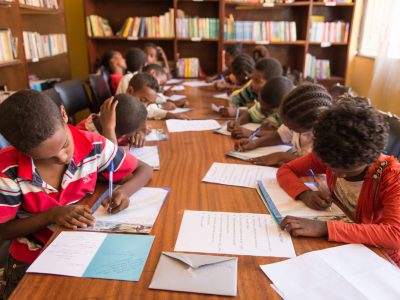
Dear Sponsor: A Letter From Rwanda
“Life has meaning when someone touches it at tender age. Someone stood out and shaped my life. I believe in life of fullness. Thank you my sponsor where ever you are.” – Ruzamba Niyomwungeli
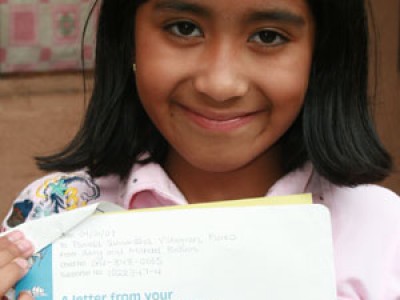
The Journey of One Letter
Have you ever wondered how your sponsored child’s letter gets to you? The long journey it takes from Tanzania or Thailand to Connecticut or California? There’s a lot more to it than you might think!
Samuel Llanes, Guatemala’s Field Communication Specialist, gives us a peek at the journey of one letter from Guatemala to a sponsor in Australia.
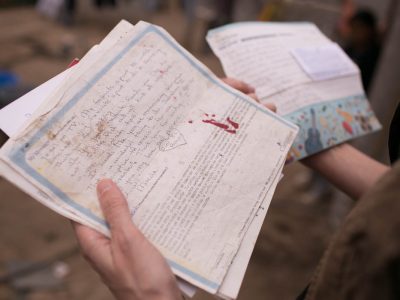
Are My Letters Really That Important?
This is a sample of what the children I sponsor write to me. Although the words are different, they often have the same message.


